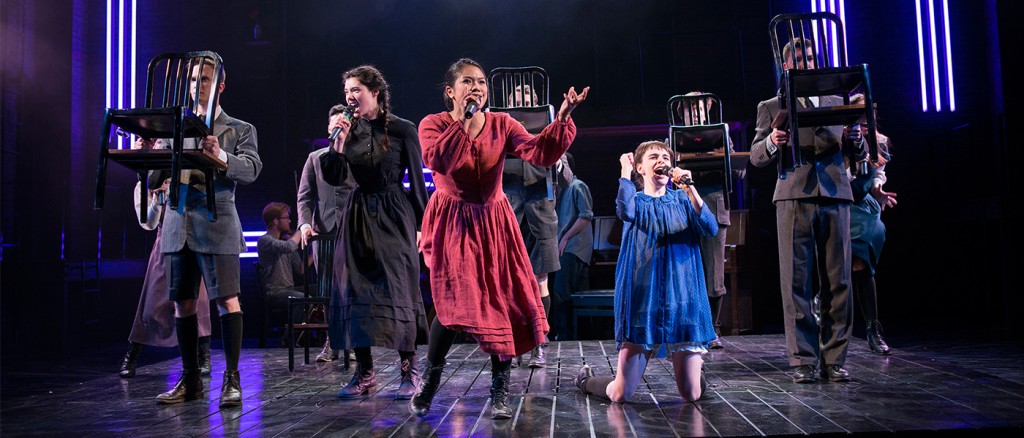Keith Richards famously observed, “Rock is music for the neck down.” Imperial Germany in 1891 was a society rapidly moving ahead scientifically and, intellectually, a nation that exalted the cranium. What lay below the neck was best not discussed, and when it was, it should be obedient and disciplined, tightened up and straightened.
Next door in Austria, Dr. Freud was scrutinizing all our organs, but in Germany the artist ready to celebrate the bodily and the carnal was playwright Frank Wedekind. His Spring Awakening, now thought a landmark in theatrical history, was heavily pounded by censors and not performed in Germany for 15 years. Less than 10 years ago, composer Duncan Sheik and lyricist Steven Sater thought it sounded like the libretto of a rock opera. Their Tony-winning result is now at Ithaca’s Hangar Theatre.
The original German-language Spring Awakening, a product of its time, is an Ibsenite problem play with heavy sets and clanking stage machinery. In the Sheik-Sater version, only the costumes are retained. In the strictly repressive school, with gender segregation, the girls are in long dresses and most of the boys wear high top shoes and knickers. All the grief the youngsters suffer in spoken dialogue is of their time. But when they sing and dance, a sensibility from contemporary America goes back to inhabit them. And the beat is throbbing and obsessive.
At the beginning of the action, a girl going through puberty wonders aloud to her mother why her body is behaving this way and, while she’s at it, if storks really deliver babies. Wendla (Kelsey Lake, a blue-eyed reincarnation of Audrey Hepburn) launches the first act with “Mama Who Bore Me,” in the idiom of a golden age musical, perhaps by Lerner and Loewe. Moments later the other girls join her with the same words, now in the rock idiom of this show.
Wendla’s mother (Sarah Dacey Charles) explains, guiltily, that to make babies a woman really just has to love her husband very much. Charles, with a long, Nordic face and prominent chin, plays all the adult women, some distinguished by a flourish. Round-faced Dane Cruz takes on all the adult men, some with facial hair, others with clerical collars.
Cruz’s schoolmaster is a tyrant who terrorizes the boys with Latin recitation, where minor flubs invite corporal punishment. The class klutz Moritz (Johnny Shea) fecklessly drops a line, prompting the class brain Melchior (Robert Ariza) to speak up on his behalf. He also reflects on the narrow injustice of it all in the solo “All That’s Known.”
This favor invites Moritz to speak of the erotic dreams that have been plaguing him, which he fears are signs of mental disorders and derangement. Until Melchior, who’s done some reading in forbidden literature, tells him such dreams are widespread. The other boys join in with their dream narratives, and embarrassment to guilt-ridden Moritz, prompting the big production number, “The Bitch of Living,” probably the most widely known selection from the show.
The official public policy of puritanism does not mean that all adults are well-behaved sexually, as Martha (Hanako Greensmith) admits that her father’s physical abuse of her includes sexual elements. One male student, Hanschen (Aidan Kahl Elsesser), masturbates to an erotic post card, and all the students sing out their hunger for physical intimacy with the opposite sex in “Touch Me.”
By the end of the first act, all this dramatic and sexual tension is resolved when Melchior and Wendla meet in a hayloft, as the combined male and female choruses support the lovers in the hymn-like “I Believe.”
The second act, which sees Melchior and Wendla paying a price for their love-making, includes some of the strongest musical numbers, such as the “Blue Wind” solo by Ilse (Shea Renne), Melchior’s production number “Totally Fucked,” and Moritz, Melchior and Wendla’s trio, “Those You’ve Known.”
Spring Awakening remains controversial. Despite eight Tony Awards, four Drama Desks, and a Grammy for the cast album, this dynamic Hangar production is likely to be the only one you’ll see in this part of the world.
Header photo: Cast members of Hangar Theatre’s Spring Awakening. Rachel Philipson photo.



